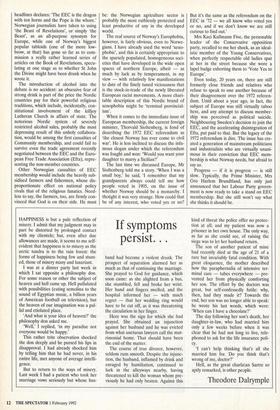If symptoms persist. . .
HAPPINESS is but a pale reflection of misery. I admit that my judgment may in part be distorted by prolonged contact with my clientele; but, even after due allowances are made, it seems to me self- evident that happiness is to misery as the arctic tundra is to the rain forest: the forms of happiness being few and stunt- ed, those of misery many and luxuriant.
I was at a dinner party last week in which I sat opposite a philosophy don. For some reason or other the subject of heaven and hell came up. Hell pullulated with possibilities (eating semolina to the sound of Egyptian music, a billion years of American football on television), but the heaven of our imagination was a pal- lid and etiolated place.
'And what is your idea of heaven?' the philosophy don asked me.
'Well,' I replied, 'in my paradise not everyone would be happy.'
This rather trite observation shocked the don deeply and he pursed his lips in disapproval. I had already shocked him by telling him that he had never, in his entire life, met anyone of average intelli- gence.
But to return to the ways of misery. Last week I had a patient who took her marriage vows seriously but whose hus- band had become a violent drunk. The prospect of separation alarmed her as much as that of continuing the marriage. She prayed to God for guidance, which soon came: as she alighted from a bus, she stumbled, fell and broke her wrist. Her hand and fingers swelled, and the hospital informed her — with much regret — that her wedding ring would have to be cut off, as it was threatening the circulation in her finger.
Here was the sign for which she had prayed. She obtained an injunction against her husband and he was evicted from what unctuous lawyers call the mat- rimonial home. That should have been the end of the matter.
The course of true divorce, however, seldom runs smooth. Despite the injunc- tion, the husband, inflamed by drink and enraged by humiliation, continued to lurk in the alleyways nearby, having threatened to kill the woman whom pre- viously he had only beaten. Against this kind of threat the police offer no protec- tion at all; and my patient was now a prisoner in her own house. The only way, as far as she could see, of raising the siege was to let her husband return.
The son of another patient of mine had recently died at the age of 21 of a rare but invariably fatal condition. With great eloquence, the mother described how the paraphernalia of intensive ter- minal care — tubes everywhere — pre- vented her from physically comforting her son. The effort by the doctors was great, but self-confessedly futile: why, then, had they made it? Towards the end, her son was no longer able to speak: he wrote his last words, which were: 'When can I have a chocolate?'
The day following her son's death, her daughter-in-law, who had married him only a few weeks before when it was clear that he had not long to live, tele- phoned to ask for the life insurance poli- cy.
'I can't help thinking that's all she married him for. Do you think that's wrong of me, doctor?'
Hell, as the great charlatan Sartre so aptly remarked, is other people.
Theodore Dalrymple


















































 Previous page
Previous page